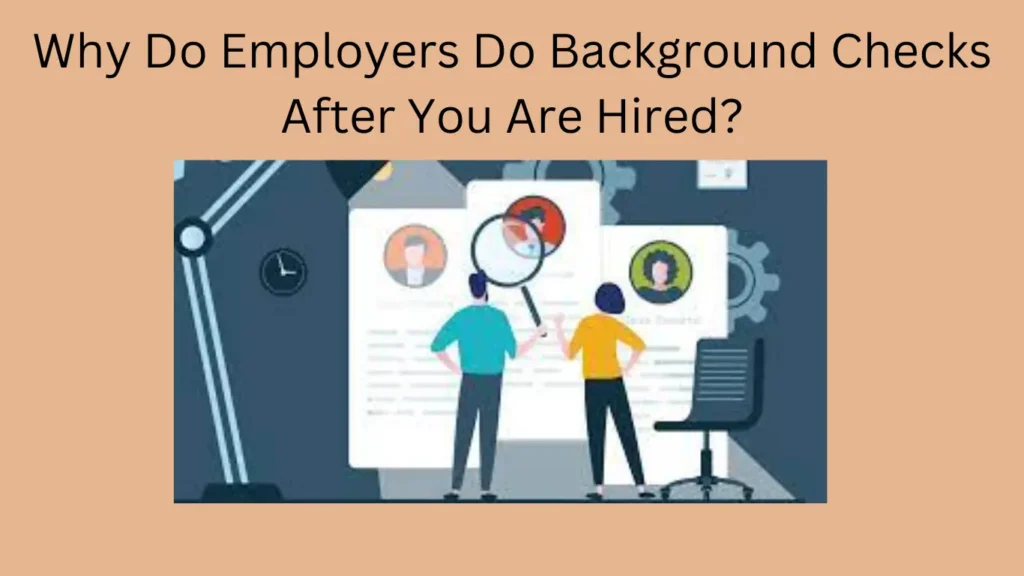A corporation is nothing without a potential workforce, so it is critical to ensure that everyone in your group is both competent and experienced. That is why you must carefully consider your employee screening process. By conducting pre- and post-employment background checks, you can ensure that the workforce you are hiring will continue to be the quality candidates your company seeks. One of the biggest challenges facing employers today is finding the right employee for the right job. Unfortunately, this task has become more difficult in light of the global economy and a highly mobile workforce.
Post-employment screening services, as opposed to pre-employment checks, investigate current employees’ backgrounds. These regular reviews assist in maintaining the expectations you necessitate of new employees. Even if you hire good potential, situations can still go wrong during their tenure. If you are uninformed of the problem, it is more likely that it will impact your firm in the future. Regular background checks keep your employees protected and accountable throughout their time with you. This implies that you can rest easy knowing that the excellent individuals you initially hired are representing your company.
Distinction Between Background Checks After Employment and Pre-Employment Screening
Of course, the most important difference between pre- and post-employment screening is the duration. Pre-employment screening must be done before you hire a candidate. It is the process of finding out more about a candidate’s background, qualifications, and past experiences while also getting a better understanding of their character and behavior. The goal of a post-employment background check is to learn more about the pasts of your existing workers. These checks help to preserve the integrity and high standards of your team. An effective method for locating candidates with a history of destructive but non-violent workplace misconduct is post-employment screening. To learn more about the distinctions between a pre-employment and post-employment background check, click this link.
The advantages of carrying out background checks after hiring
Even while the majority of employers run background checks prior to hiring, post-employment screening is becoming more and more common. Employers may receive notice of changes in criminal activity through repeated checks, but they may also uncover any recent convictions, which can be important information for people in positions of trust or those handling big quantities of money. If a worker continues to commit crimes, the company’s reputation could be damaged irreversibly. Customers’ confidence in your business could be damaged by the severity of the illegal action. Think about the news reports concerning long-term or even decades-long illegal activities involving sexual abuse in child care centers and religious groups.
Companies considering implementing continuous screening every two or three years should consider the worst-case scenario for each position. Moreover, it can be helpful and effective to prioritize those in critical tasks for more thorough checks over those with minimal interaction with customers and to customize checks to certain roles.
Nowadays, most companies understand how important pre-employment screening is. Pre-employment verification is a one-time process that doesn’t reveal details about a candidate’s past beyond what was discovered during the pre-employment check. An organization must exercise diligence and put in place an ongoing post-employment check policy. On their resumes, candidates occasionally give false information that suggests recommendations based on the candidate’s needs.
Most workers expect to be screened at some point during the hiring process. Some people might be surprised to learn that employers are legally permitted to run a background check on a prospective employee. Both times, the company must follow adverse action policies and the employee must have provided written consent to be screened. The reasons behind conducting a background check subsequent to hiring vary based on the industry, career advancements, or other occurrences that can prompt rescreening by the employer. Certain industries’ employers routinely run background checks on new hires in order to lower the risk to their clients, their company, and other staff members. After employment, background checks are either advised or necessary in highly regulated or fraud-prone businesses. To perform repetitive background checks you will require:
Potential employees’ consent for a post-employment background check must be made clear in order to prevent employee discontent or mistrust of the company.to guarantee that the screening is appropriate for each employee’s prospective position.Regular rescreening of employees is necessary. Every 12 to 18 months, rescreening should be done to make sure that no issues have emerged since the start of employment.Think about making use of an updated service that gives you regular access to staff data.
It’s critical to identify and address any possible risks to your firm in the fiercely competitive business world of today. Having dependable workers will improve the reputation of your business, but you need to be aware of who you’re working with.
Post-Hire Background Checks: Employer Reasons”
For further Inquires Contact Us
FAQs
Q: Why do some employers conduct background checks after hiring an employee?
- A: Employers may conduct post-hire background checks to ensure ongoing compliance with company policies, industry regulations, and legal requirements.
Q: What types of post-hire background checks are commonly conducted?
- A: Post-hire background checks may include periodic criminal background checks, drug tests, and checks for professional licenses or certifications.
Q: How do post-hire background checks benefit employers?
- A: Post-hire background checks help employers identify any new risks or issues that may have arisen since the initial hire, ensuring continued workplace safety and integrity.
Q: Are there any limitations to conducting post-hire background checks?
- A: Employers must comply with applicable laws and regulations, including obtaining employee consent and ensuring the confidentiality of the information obtained.
Q: How should employees prepare for post-hire background checks?
- A: Employees should be aware of the possibility of post-hire background checks and ensure that their records and credentials are up to date and accurate.
